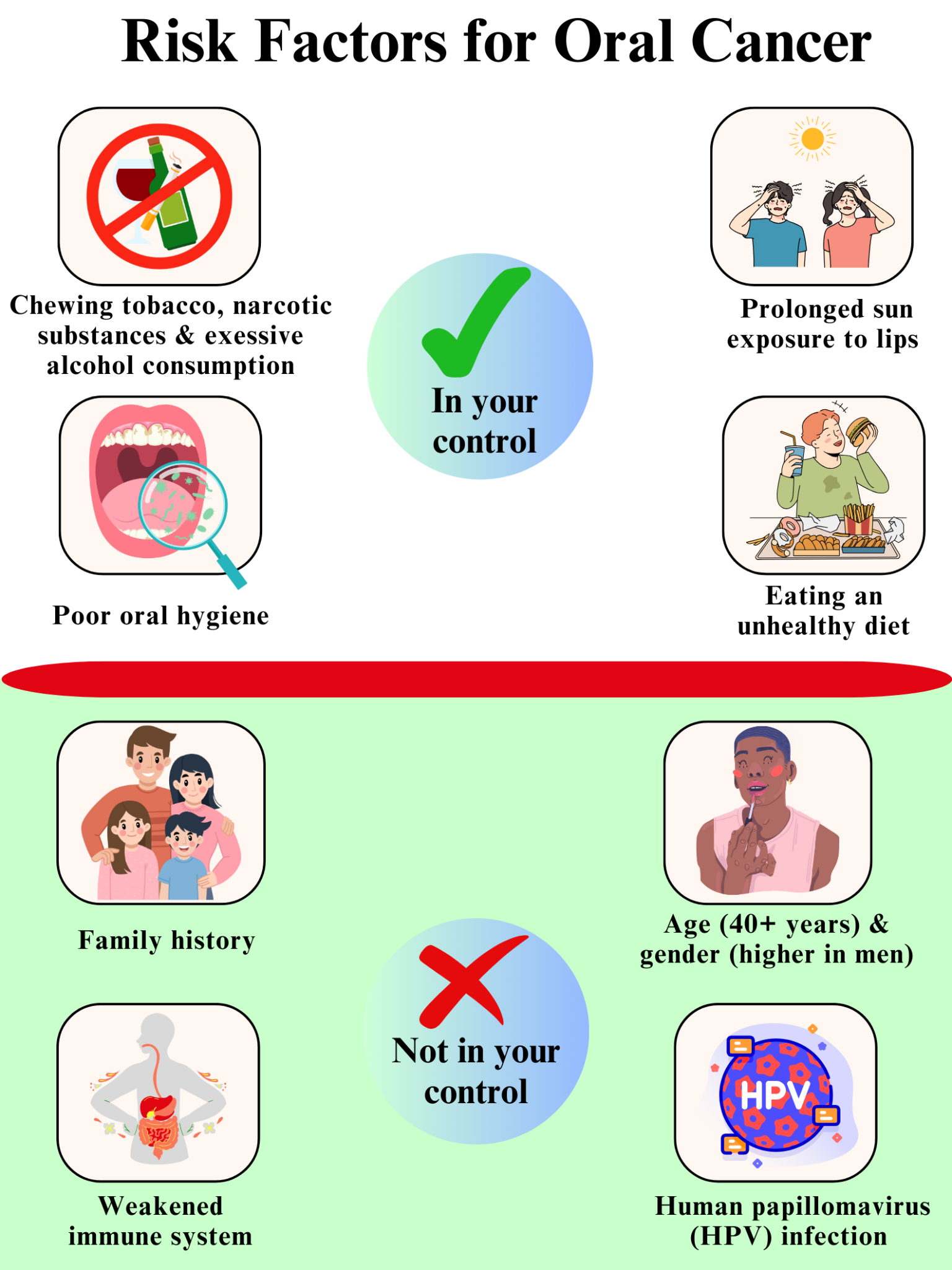
What You Should Know About Oral Cancer
What is Oral Cancer?
Oral cancer, commonly known as mouth cancer, can affect various parts of the oral cavity, including the lips, tongue, cheeks, gums, floor of the mouth, roof of the mouth (hard and soft palates), sinuses, and throat (pharynx). It is more common in men than in women. In India, it is the leading cause of cancer- related deaths among men, accounting for approximately 15.6% of all such deaths.
This type of cancer often starts as a small sore, lump or ulcer that does not heal or go away over time. Oral cancer can spread to nearby tissues, including lymph nodes, bones and other areas like the head and neck if not detected and treated early. It is a serious condition that can lead to difficulties such as speaking, eating or swallowing.
What are the symptoms of Oral Cancer?
The most common symptoms of oral cancer are:
1. Persistent sores or ulcers in the mouth that do not heal within two weeks
2. Continuing pain & swelling in the neck and ear or persistent sore throat
3. White or red patches on the gums, tongue, or lining of the mouth
4. Loose teeth or changes in dental fit
5. Difficulty chewing, swallowing, speaking, or moving the tongue, or feeling that something is stuck in the throat
6. Unexplained bleeding in the mouth
7. Excessive salivation and a hoarse voice
If any of these symptoms persist for an extended period or worsen over time, it is essential to seek medical attention promptly.
What are the risk factors leading to Oral Cancer?
Several factors increase the likelihood of developing oral cancer:

What are the complications of Oral Cancer?
Complications from oral cancer can be severe and may include:
- Oral cancer can spread (metastasize) to other parts of the body, including lymph nodes and distant organs such as the lungs or liver. This progression complicates treatment and worsens prognosis.
- Tumours may obstruct normal functions such as opening the mouth, chewing and swallowing or affect speech clarity. This can lead to nutritional deficiencies due to reduced food intake.
- Patients may struggle with maintaining adequate nutrition due to difficulty in opening mouths, pain or difficulty swallowing. This can result in weight loss and other health issues.
- The diagnosis of oral cancer can cause significant emotional distress. Changes in appearance, such as facial disfigurement, can greatly affect self-esteem and social interactions, often leading to anxiety and depression.
How is Oral Cancer diagnosed?
The diagnostic process typically involves several steps:
- The healthcare provider will conduct a thorough clinical examination of the mouth and throat to identify any abnormalities.
- If suspicious lesions are found during examination, a biopsy will be performed. This involves removing a small sample of tissue for laboratory analysis to confirm whether cancerous cells are present.
- Additional tests such as X-rays, CT scans, MRI scans or PET scans may be utilized to determine if cancer has spread beyond its original site.
- In some cases, an endoscopic procedure may be performed to visualize areas deeper within the throat.
How is Oral Cancer treated?
Every cancer needs a specific treatment. A doctor will recommend treatment based on several factors including tumour size, location, stage at diagnosis and overall health status. Cancer treatment if advised must start without delay and without interruption. Cancer treatment is patient-specific and could involve:
- Surgical intervention Often involves removing tumours along with surrounding healthy tissue to ensure complete excision. In some cases, lymph nodes may also be removed if they show signs of metastasis.
- Radiation therapy Uses high-energy rays to kill cancer cells or shrink tumours. Radiation may be employed alone or alongside surgery as an adjuvant therapy to eliminate remaining cancer cells post-surgery.
- Chemotherapy Involves using drugs that target rapidly dividing cells throughout the body. It may be used before surgery (neoadjuvant therapy) to shrink tumours or after surgery (adjuvant therapy) to reduce recurrence risk.
- Targeted therapy Newer treatments that focus on specific molecular targets rather than all cells indiscriminately.
The treatment choice will be made by the oncologist and will depend on individual circumstances.
How can we prevent Oral Cancer?
Preventive measures play a crucial role in reducing the risk of developing oral cancer:
- Do not ever consume tobacco in any form. If combined with alcohol, the risk is multifold.
- Maintaining proper dental care routines—such as regular brushing and flossing.
- Get immunised against hepatitis B & human papillomavirus infection.
- Prevent sexually transmitted and human papillomavirus infection.
- Routine visits to a dentist allow for early detection.
- Medically Validated by: Dr Reena
- Latest Updated on: 30.01.2024
 Back
Back